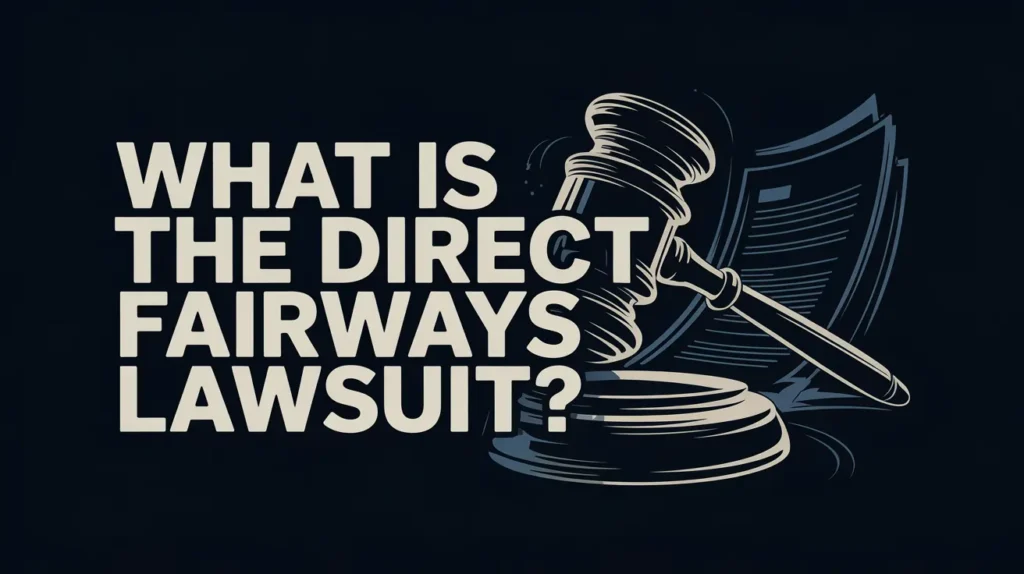In the fast-paced world of marketing and advertising, companies often push boundaries to stand out. But sometimes, those pushes cross legal and ethical lines. One such example that has recently captured attention is the Direct Fairways lawsuit. Known for specializing in golf course marketing and advertising, Direct Fairways has built a sizable clientele across the United States. However, mounting legal challenges have sparked industry-wide debate about sales tactics, consumer protection, and business ethics.
This article takes a deep dive into the Direct Fairways lawsuit, examining the origins, allegations, responses, and broader implications of the case. Whether you’re a business owner, a legal professional, or simply curious about the intersection of marketing and law, this comprehensive breakdown will help you understand why this lawsuit matters.
What is Direct Fairways?
Background and Business Model
Direct Fairways is a marketing firm that offers advertising opportunities primarily through golf-related publications and signage. Their core product involves selling ad space on scorecards, yardage books, and signage at golf courses across the U.S. The company claims to help small businesses reach affluent, leisure-oriented clientele who frequent golf courses.
Founded with the intent of tapping into the niche market of golf enthusiasts, Direct Fairways leveraged a relatively unique business model. Their representatives reach out to local businesses offering promotional spots in custom materials distributed at golf courses.

Growth and Expansion
In a few short years, the company grew rapidly, expanding its presence nationwide. Its sales strategy often included high-volume cold calls and persuasive sales pitches. However, as the company scaled, complaints and red flags began to surface, eventually leading to legal scrutiny.
The Spark: Origins of the Direct Fairways Lawsuit
Complaints and Allegations
As Direct Fairways gained traction, so did the volume of complaints filed by disgruntled customers. Numerous small business owners reported being misled by sales representatives. Common complaints included:
- High-pressure sales tactics
- Unclear or misleading contracts
- Failure to deliver on advertising promises
- Difficulty obtaining refunds or cancellations
These issues culminated in formal complaints filed with the Better Business Bureau (BBB), state Attorneys General, and eventually in the courts. The Direct Fairways lawsuit centers around these consumer grievances, asserting that the company engaged in deceptive business practices.
Who Filed the Lawsuit?
The lawsuit was initiated by a combination of individual business owners and state regulators. One significant legal action came from the Attorney General of a state where Direct Fairways had a substantial operational footprint. Plaintiffs argue that the company violated consumer protection laws by misrepresenting its services and failing to uphold contractual agreements.
Legal Grounds and Key Issues
Misrepresentation and Fraud
At the heart of the lawsuit is the claim that Direct Fairways knowingly misrepresented the value and reach of their advertising services. Plaintiffs allege that sales reps exaggerated audience size, distribution volume, and the effectiveness of the ad placements.
Breach of Contract
Many business owners claim that they never received the advertising products they paid for, or that what was delivered was substandard. In several cases, customers were billed for services they never authorized, further aggravating the situation.
Consumer Protection Violations
The lawsuit also contends that Direct Fairways violated multiple state-level consumer protection laws. These include statutes that prohibit deceptive trade practices and mandate transparency in sales transactions.
Direct Fairways’ Response to the Lawsuit
Denial of Wrongdoing
Direct Fairways has publicly denied any intentional wrongdoing. The company maintains that its sales strategies are legitimate and that any discrepancies were the result of miscommunication or isolated incidents.
Efforts to Rectify
In response to the growing backlash, Direct Fairways has taken steps to address customer concerns. These include:
- Revising sales training procedures
- Implementing more transparent contract language
- Offering refunds or make-goods in certain cases
However, critics argue that these changes are reactive and insufficient.
Impact on Clients and the Industry
Small Business Fallout
The clients most affected by the Direct Fairways lawsuit are small business owners who relied on promised exposure to grow their local customer base. For many, the financial loss was significant, especially considering the high costs of print advertising in specialized markets.
Industry-Wide Reflection
The legal action against Direct Fairways has prompted broader introspection within the advertising industry. Questions are being raised about the ethics of sales practices, especially in niche markets where clients may lack the resources to fully evaluate marketing ROI.
Regulatory Implications
State regulators are watching the case closely, and its outcome could lead to stricter oversight of marketing companies. Legal experts suggest that a ruling against Direct Fairways could set a precedent for similar cases.
Lessons Learned from the Direct Fairways Lawsuit
For Businesses
- Read Contracts Carefully: Many of the issues stemmed from customers not fully understanding what they were signing.
- Verify Claims: Always ask for data and references when a marketing firm promises high returns or wide reach.
- Document Everything: Keeping records of all communications and transactions can be invaluable if legal issues arise.
For Marketing Firms
- Transparency is Crucial: Clear communication about what clients will receive builds trust and reduces legal risks.
- Training Matters: Sales representatives must be trained not only in product knowledge but also in ethical selling practices.
- Follow Through: Delivering on promises isn’t just good business; it’s a legal necessity.
The Road Ahead: What’s Next?
Ongoing Litigation
As of now, the Direct Fairways lawsuit is still making its way through the courts. Legal analysts predict that the case could take months, if not years, to resolve due to its complexity and the number of parties involved.
Potential Settlements
There is speculation that Direct Fairways may seek to settle the case out of court to avoid further negative publicity. However, any settlement would likely include stipulations for restitution and business practice reform.
Long-Term Consequences
Whether through a court ruling or settlement, the lawsuit is expected to have lasting consequences for Direct Fairways. These could include financial penalties, reputational damage, and even changes to its business model.
Conclusion
The Direct Fairways lawsuit serves as a cautionary tale about the fine line between aggressive marketing and deceptive business practices. While Direct Fairways continues to defend its actions, the legal proceedings have already ignited important conversations within the advertising world.
For businesses seeking marketing services, this case highlights the importance of due diligence and consumer awareness. For the industry at large, it signals a shift toward greater accountability and transparency. Regardless of the outcome, the Direct Fairways lawsuit will likely be remembered as a pivotal moment in the ongoing evolution of marketing ethics and consumer protection.
Stay informed, ask questions, and always insist on clear, honest communication—because in business, trust is everything.



